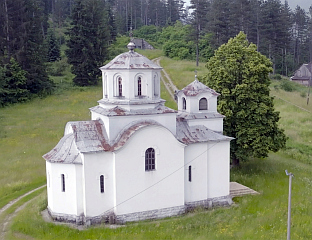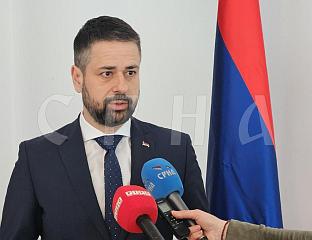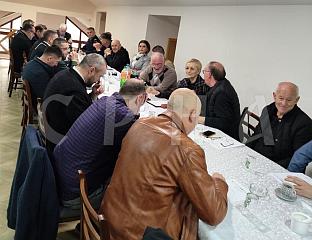English
19.04.2025

LOZO: DONJA GRADINA REMAINS IN SRPSKA AS A SYMBOL AND REMINDER OF THE GREATEST SUFFERING OF SERBS

BANJA LUKA, APRIL 19 /SRNA/ - Historian Predrag Lozo told SRNA that the Donja Gradina killing ground remained in Republika Srpska as a symbol and reminder of the greatest suffering of the Serbian people in history, pointing out that women and children were killed in the Jasenovac camp complex, which speaks of the intention of total destruction of Serbs in the NDH.
"The camp inmates didn't even come to Jasenovac, but were taken to Gradina and destroyed in the most terrible ways. We have 105 burial fields there alone. That's how history wanted Donja Gradina, the largest killing ground of Serbs, to remain in Republika Srpska," Lozo pointed out in the SRNA podcast. He stated that dehumanization in the NDH led a genocidal policy against Serbs, where brutality in crime was desirable, and that the complex of camps, the largest of which was Jasenovac, was the way for the systematic destruction of Serbs in a wider area controlled by the Ustasha. "By preparing the crime, someone convinced the Croat neighbor that the Serbs are evil and excess in the NDH and that they are waste that should be removed. At the moment when they commit evil, they think that it is useful for a community," Lozo pointed out. He says that, unfortunately, numbers have become the main characteristic for observing crimes against Serbs in the NDH. "Since the formation of the NDH, a large number of camps have been functioning. First, individual camps and penitentiaries are opened, and the Gospić - Jadovno - Pag death camp system has been opened since April. Gospić was a railway hub. Based on historical experience, the NDH realized that a serious infrastructure is needed for such a scale of crime," said Lozo. He stated that the Velebit pits were chosen for a reason because they are deep, and the victim has no chance to survive and suffers a lot. "According to research, that camp complex 'swallowed' 38,000 Serbs. There were also a large number of Serbs from Herzegovina and Srem. The Serb people then began to fight for survival, which is why the Italians decided to close that complex and the Jasenovac death camp complex was founded," Lozo recalled. He says that we should always point out the fact that the largest number of our ancestors were killed by Ustashas in the NDH on their doorsteps, which speaks of the scale and prevalence of the crime. "That tells you about the systematic nature of the crime. There is a widespread atmosphere about the desirability of crimes against Serbs, Jews and Roma. It is a painful fact that a large number of our neighbors, Croats and Muslims, participated in those crimes," Lozo pointed out. He says that neither then, nor in the nineties, there was any empathy towards the Serbian victims. "When someone disputes your right to respect and mourn the victim, he disputes your right to political action and existence in one space," emphasized Lozo. He assessed that the brutality of the crimes against Serbs in the NDH was worrisome, adding that it was the product of systematic preparation where the narrative was adopted that it was desirable to kill a Serb and that no one would be held accountable for it. "In Prebilovci, someone took over 600 women and children and threw them into a pit over a hundred meters deep," Lozo pointed out. He states that the fact that numerous Ustasha who killed Serbs ended up in the partisans at the end of the war and that they returned to their lives as if nothing had happened is worrying. "That is why it is important to remind the young generations that the trivialization of relations between human groups did not bring anything good and that it produced NDH, among other things," Lozo stressed. He states that NDH was the only system in the world that had camps for children. "These are all characteristics of the NDH. We as a society must make an effort to escape from the story of counting and we must understand the crime as a crime against individual ancestors - brothers, friends, godfathers. Jasenovac is the biggest symbol of suffering in the NDH and Donja Gradina as the biggest Serbian execution ground," Lozo stressed. He stated that Jasenovac, as written in NDH documents, had unlimited capacity, which confirms the thesis that it was founded solely because of the systematic killing and destruction of Serbs. "The inmates who were brought from the surrounding villages or by trains, died and were killed in the most difficult tortures," said Lozo. He added that Jasenovac was not liberated, but that the camp inmates broke through on April 22, in order to save their lives. "That was the only chance to save their lives. Members of the Yugoslav Army entered Jasenovac ten days later. The inmates freed themselves" Lozo stressed.
English


KOVAČEVIĆ WITH FINE: WE PROTECT SHARED CIVILIZATIONAL VALUES AND MUST NOT FALTER IN THIS STRUGGLE
WASHINGTON, MARCH 5 /SRNA/ - Radovan Kovačević, a Serb member of the House of Peoples of the Parliamentary Assembly of BiH, said that he had a brief m...


CHURCH IN OLOVO REGISTERED AS PROPERTY OF MUNICIPALITY AND SOC
ISTOČNO SARAJEVO, MARCH 5 /SRNA/ - The Municipal Court in Visoko registered two entities as sole owners of land belonging to the Serbian Orthodox Chur...


CVIJANOVIĆ TAKES PART IN "NATIONAL SOVEREIGNTY AND FOREIGN MIGRATION" PANEL IN WASHINGTON
WASHINGTON, MARCH 5 /SRNA/ – Željka Cvijanović, Serb member of the BiH Presidency, is participating in the panel "National Sovereignty and Foreign Mig...


AMIDŽIĆ: COUNCIL OF MINISTERS COMPLETED GROWTH PLAN OBLIGATIONS, PRIORITY PROJECT LIST STILL AWAITED
SARAJEVO, MARCH 5 /SRNA/ – The Minister of Finance and Treasury in the Council of Ministers Srđan Amidžić stated that the Council has completed all ob...


JULY 4 COMMEMORATION FOR SERBS KILLED IN BIRAČ
BRATUNAC, MARCH 5 /SRNA/ – A memorial service and tribute for 3,267 fallen Serb civilians and soldiers from the Birač region will be held in Bratunac...


CVIJANOVIĆ HONORED TO ATTEND INAUGURAL ALLIANCE OF SOVEREIGN NATIONS SUMMIT
WASHINGTON, MARCH 5 /SRNA/ – Željka Cvijanović, Serb member of the BiH Presidency, has stated that she is greatly honored to participate in the Inaugu...





 LATEST NEWS:
LATEST NEWS: